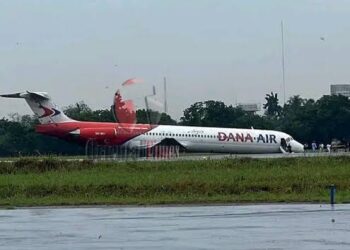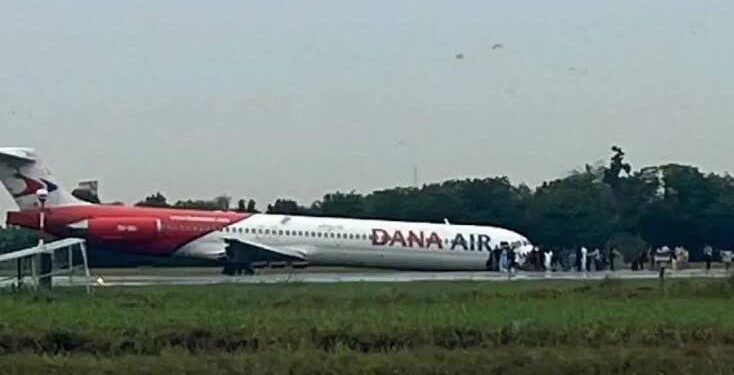The Nigerian Safety Investigation Bureau (NSIB), investigating the cause of the Dana Air incident where an aircraft skidded off the runway at Murtala Muhammed Airport, has released a preliminary report on the incident.
Brief Background
On April 23, 2024, a Dana Air aircraft with registration number 5N-BKI skidded off the runway at Murtala Muhammed Airport in Lagos. This incident led to the immediate suspension of Dana Air’s operations by the Nigeria Civil Aviation Authority (NCAA). Dana Air management confirmed that the aircraft, which was flying from Abuja to Lagos, skidded off the runway during landing. Fortunately, no casualties were reported. The airline informed both the Accident Investigation Bureau (AIB) and the NCAA about the incident.

Report from the Nigerian Safety Investigation Bureau
The NSIB’s preliminary report, obtained by PUNCH Online on Saturday, attributed the incident to a failed Nose Landing Gear (NLG). The report detailed that severe vibration and a loud noise from the NLG area were observed. Upon reaching 80 knots, the Captain noted the collapse of the NLG, resulting in a loss of directional control.
The report stated, “The landing was soft. During the landing roll, the Captain deployed Speed Brakes and Thrust Reversers, then lowered the nose of the aircraft. At this point, severe vibration accompanied by a loud noise from the NLG area was noticed. Upon reaching 80 knots, the Captain observed the collapse of the NLG and a subsequent loss of directional control.”
The aircraft veered to the left, exited the runway, and continued on the grass verge, crossing the paved Link 6 before coming to a stop approximately 2,343 meters from the threshold and 36 meters from the runway centerline. The Captain shut down the engines and ordered an evacuation through the Forward Service Door due to safety concerns. The Cabin Crew deployed the escape slide, and all occupants evacuated without injury.
Why It Matters
Airline safety is crucial to prevent aircraft accidents, which can be catastrophic with high fatalities. Ensuring that aircraft are well-maintained and undergo routine checks before flights is essential. The report highlights potential maintenance lapses and underscores the importance of rigorous safety protocols.
Bottom Line
The NSIB report calls for stricter monitoring of aircraft safety to prevent similar incidents. Enhanced oversight of airline maintenance practices is necessary to ensure that all aircraft are in optimal condition before flight. This vigilance is vital for maintaining passenger safety and confidence in air travel.

















